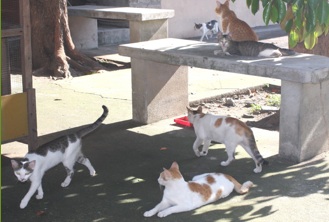Here in the Philippines, you’d be hard-pressed to find a local community or barangay without its own feral cat colony. Stray Puspin (or Pusang Pinoy) colonies are oftentimes brought about by irresponsible pet ownership, unmonitored breeding practices, and ineffective animal population control; stark results of corruption, and lack of education when it comes to spay/neuter veterinary services in the country. Many pet parents are simply unaware of spay/neuter and its benefits to the community, both short and long-term. Certainly, this is one instance when ignorance simply won’t do.
Our pets function according to their natural and primitive instincts, and for domestic cats, this means succumbing to their heat cycles which could yield on average, 2 to 3 litters of 2 to 5 kittens per year. That’s a total of possibly 15 kittens for each cat couple. Now I ask you, is there anyone in this country prepared to properly raise 17 cats in one year? I think not. And as with all other issues our country’s facing right now, this is where the importance of education comes in.
Spaying/Neutering is the veterinary procedure of removing a dog’s or a cat’s reproductive organs, rendering it incapable of producing puppies/kittens. While it sounds painful (and to most Filipinos, pitiful), responsible pet owners and animal welfare advocates see it as the most humane way of controlling the local animal population. Adoption drives and animal rescues are all admirable endeavors. But in order for the different shelters and animal welfare groups to retain sustainable adoption set-ups, it is important for local government units and communities to address the root of the problem: pet overpopulation.
For starters, what is Trap-Neuter-Release (TNR)? Simply put, it is the process of humanely trapping stray cats, sending them to low-cost veterinary clinics for spaying/neutering and vaccinating, and returning them to the community they call home. Practiced for decades in the US and Europe, TNR effectively stops the breeding cycle of colony cats which directly eliminates stray overpopulation in that certain community. Furthermore, mating behaviors like spraying, fighting, howling, and roaming will be eliminated. With TNR, stray cats are given the chance to live lives free from unnecessary impounding and euthanasia.
Traditional animal control practices of removing and impounding strays have been proven to be ineffective and never-ending. No matter how many strays they catch, there will always be more because cats won’t stop breeding. It is then important to invest in a stable program where the real root of the problem is tackled in the most humane way possible.
CARA Welfare Philippines has been advocating TNR for as long as the group has been established. The group has been successfully providing TNR solutions customized to the needs of certain communities. By partnering with villages, barangays, and even office districts, CARA has not only successfully controlled stray cat population in certain areas, but also given forever loving homes to some of the stray cats they’ve handled.
If you’re interested in sponsoring your own TNR operation or if you want to know how you can convince your community leaders to champion TNR, visit the CARA website at caraphil.org.



